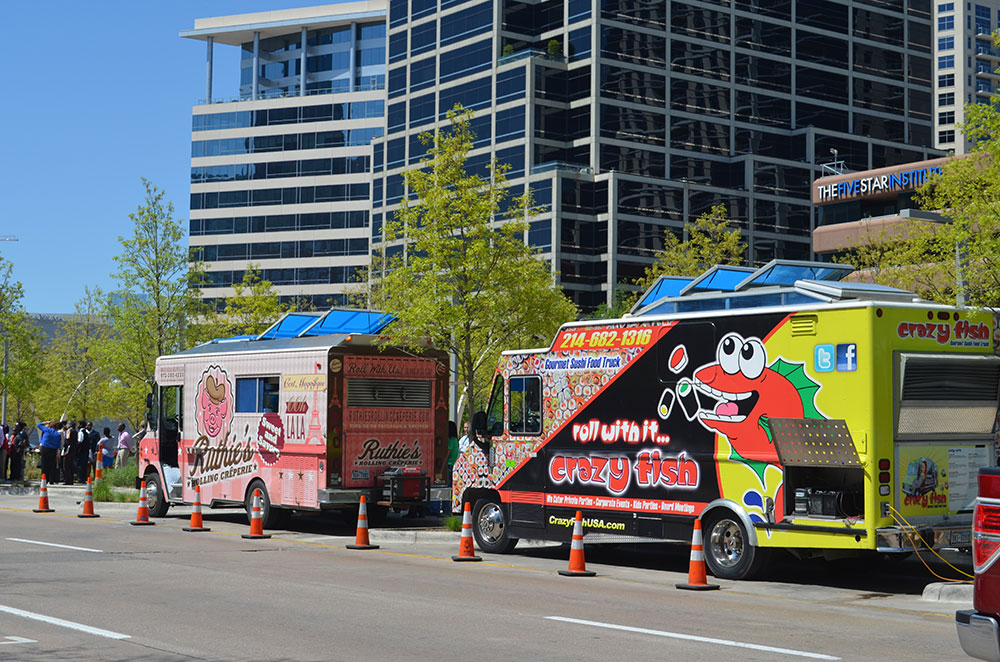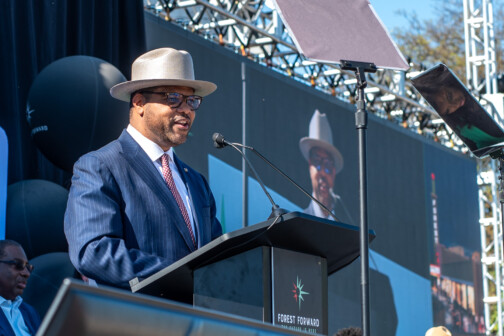The city of Dallas is another step closer to loosening its archaic requirements of mobile food trucks and trailers.
The City Council’s Quality of Life Committee on Tuesday unanimously recommended staff to present a new ordinance to the full Council that includes four major changes to its existing rules. The goal is to even the playing field between the costly food trucks and the cheaper trailers and carts; allow these operators to cook and serve fresh seafood and poultry on-site, which is currently illegal; reduce mandatory commissary visits from once per day to once per week; and lower the fees charged to operators, particularly push carts and stalls.
Tuesday’s briefing included new research by city staff that shows how over-regulated this segment of the hospitality industry is in Dallas, particularly when compared to its peer cities. Dallas is the only city of its size that requires mobile food units—city jargon that basically describes any mobile food provider, from a food truck to a paletero—to be commercially manufactured, meaning entrepreneurs can’t use a vehicle that has been converted from something else. It’s the only city that permits food trailers to operate just at temporary events. (And, because of that, trailers have to get a permit every time they serve; trucks have to get one each year. This ordinance changes that.)
“This is a basic equity issue; food trucks are very expensive to operate,” said Mayor Pro Tem Chad West, the councilman who represents North Oak Cliff. Trucks cost around $100,000; trailers go for $20,000 to $30,000 and push carts are even cheaper. “There is a barrier to entry for the smaller guys because they haven’t had the same benefit of this ordinance that the food trucks have had.”
Dallas and Seattle are the only cities that do not allow converted portable storage trailers or shipping containers to serve food. And no other city regulates what food can be cooked like Dallas does: fresh poultry and seafood must be prepared off-site and transported to where the mobile truck or trailer is doing business.
Advocates say this has stifled the sort of vibrant food truck scene that has thrived in cities like Austin, where food trucks often set up shop near breweries and coffee shops and in designated parks. That can’t happen here. The ordinance hopes to change that.
The urbanism nonprofit Better Block has headed up the advocacy behind this effort. After the success of a food park in South Dallas about a year ago, the organization surveyed operators and attendees and formed a task force. That group came up with four recommendations, which have been adopted by city staff and will now go to Council for a vote. (How successful? More than 5,500 people came to the event over the eight days food was served. A $65,000 grant from The Real Estate Council helped cover the costs, including permitting fees.)
What also emerged is a pilot project that will designate free vending sites for mobile food units, likely at Kiest Park in Oak Cliff and Pacific Plaza downtown. Those will be first-come, first-serve for operators, likely beginning in May.
“I believe these changes are very forward-thinking from where we are and is going to put us in a much better place, particularly for small business owners,” said Councilman Adam Bazaldua, who chairs the Quality of Life Committee.
There are still some tweaks that need to happen. City staff is allowing for shipping containers to be mobile food units, but is arguing that they must have wheels. West says he’s planning to follow up on that caveat. Council isn’t totally satisfied with the fee structure, which charges a push cart more ($382 annually) than a trailer or a truck ($330 annually). West even floated cutting fees even more, saying that the average $30,000 these generate amounted to a “rounding error” in the city’s $4.35 billion operating budget.
Bazaldua, before praising the changes, suggested using federal relief dollars to offset the fees charged to operators and briefly raised concern that “corners can be cut if accountability is not built in.”
But, for the first time maybe ever, there is progress in helping food entrepreneurs get on the road. Krista Nightengale, Better Block’s executive director, said after the meeting that she was pleased with what staff presented on Tuesday. All four of the organization’s recommendations were there as well as the proposed pilot program.
Better Block and its partners have been working on this for over a year now; she recalled a city staffer telling her some of the regulations had been on the books since this employee began working at the city in 1986.
And these frustrations over food truck regulations have been burbling for at least a dozen years, when chefs started considering their own trucks and trailers only to be stifled by the city’s parking and vending codes, particularly downtown. (An aside: to see how far we’ve come, Downtown Dallas Inc.’s former planning director told this magazine in 2010 that food trucks deny “places for retail shoppers to go into a fixed business or restaurant. You are taking away a valuable asset downtown.” We understand this industry differently today.)
Staff expects to bring the ordinance to council for a vote in April.
“I think this brings the mobile food vending ordinances in Dallas up to at least the 21st century,” Nightengale said. “We always want more and would like to see this pushed a little further, but I’m excited to see what kind of impact these changes will have—assuming it passes council.”
Author






